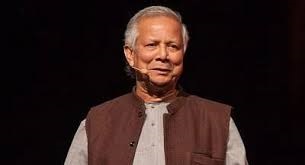Mohammad Yunus will continue to be the head of the interim government of Bangladesh, an advisor to his cabinet on Saturday, “Two days ago a prominent colleague said that he was considering the resignation.” Yunus also expressed his desire to resign at the cabinet meeting on Thursday, where his colleagues persuaded him not to resign.
Planning advisor Waheeduddin Mahmood told reporters after an underestimate meeting of the Advisory Council, “He (Yunus) did not say that he would leave the post. He said that we are facing many obstacles in fulfilling the tasks and responsibilities assigned to us, but we are overcoming them.”
Mahmud said, “He (Yunus) will definitely stop.” He said that no advisor is going anywhere, because “the responsibility assigned to us is important; we cannot be alienated from this duty.”
The Chief Advisor has decided to hold his post at a time when he told the leaders of the National Citizen Party (NCP), a student -led National Citizen Party (NCP), that they are considering resignation, because they feel that “the situation is such that they cannot work”, and they had made the difficulties failing to find a shared base for change.
Suddenly, 19 advisors, who were really ministers, attended the closed room meeting, which Yunus decided to call on the National Economic Council (ECNEC) Executive Committee in Sher-e-Bangla Nagar area of Dhaka after a scheduled meeting.
During the meeting, advisor Saeeda Rizwana Hasan told reporters that the discussion was focused on elections, Younus’s reform agenda and delayed July announcement – which was an anament to mark the rebellion of the previous year, due to which former Prime Minister Sheikh Hasina’s Awami League was out of power.
NCP convenor came out of the meeting with Nahid Islam Yunus. Islam had earlier said that he urged Yunus that “he should remain strong for the country’s security and future and meet the expectations of public rebellion, (and) I hope everyone will cooperate with him.”
Analysts saw the threat of resignation of the Chief Advisor as a test of public support and political support. The former Prime Minister Khaleda Zia’s Bangladesh Nationalist Party (BNP) and Jamaat-e-Islami are expected to meet leaders today after an overnight call for talks between the political situation emerging in recent times.
According to the press wing of the Chief Advisor, the BNP delegation will meet the chief advisors at 7 pm, while the Jamaat leaders will meet them at 8 pm. Several senior BNP leaders, including Abdul Moin Khan and Salahuddin Ahmed, had earlier said that the party hopes that Younus would take care of the general election soon and will leave the post with dignity instead of suddenly resigning.
The BNP has emerged in the lead role in the political field after the Awami League government was out of power in August last year. The Jamaat, which was seen joining the NCP after BNP was distanced from his former colleague, said that fair elections are the only way to restore public confidence.
Jamaat prominent leader Syed Abdullah M. Tahir said, “The government has said that elections will be held between December to June. Now, a specific roadmap should be announced within this period – not only elections, but also a roadmap for structural reforms in politics and state regime.” However, Chief Advisor in Younus’s cabinet Saeeda Rizwana Hasan said that the interim government has been formed not only to conduct elections, but also to implement reforms and ensure justice.
The news of Younus’s resignation has come at a time when there are reports of a possible deadline for holding parliamentary elections between the army and the interim government and differences on the policy issue related to Bangladesh’s security affairs, including the proposed human corridor of the aid channel aided in the rebel occupied Rakhine State of Myanmar.
Army Chief General War-U-Zaman met Younus three days ago with the Navy and Air Force chiefs and allegedly reiterated its demand for elections by December this year to come to power and express its objections on the issue of corridors.
The next day Zaman held a meeting of senior officials in Dhaka Cantonment and said that despite the active role of the army, he did not know about several strategic decisions. The army also decided to take a tough stand against the uncontrolled “mob justice” in the discharge of its law enforcement duties. Meanwhile, soldiers called out of their barracks with magistrate powers to maintain law and order were seen to patrol and protect the roads. Many analysts described this meeting as important to strengthen military power.
During the last year’s protests, the army avoided repressive action, and instead it helped Hasina return to India safely India. It also supported the appointment of Younis as the chief advisor, as the demand of the Shiromani Akali Dal, most of which the NCP was later formed.
The Yunus administration recently dissolved Hasina’s Awami League and sent several senior leaders, including former ministers, sent them to jail to face cases like crime against humanity.
Yunus is facing a call from political parties including BNP to declare the date of the next elections. The alleged threat of his resignation has come at a time when the party, along with thousands of supporters, held a large scale protests demanding to hold elections as soon as possible.
This week, the party also demanded the removal of the remaining student representatives from the cabinet, while the NCP demanded the removal of two advisors in response, alleging that they are fulfilling the objectives of BNP by remaining in the government.
This South Asian country with a population of about 170 million has been going through political upheaval since the expulsion of the previous government, but it has increased in the last few days when rival parties and trade unions or pressure groups have been protesting on the streets of the capital Dhaka with each other’s demands.
